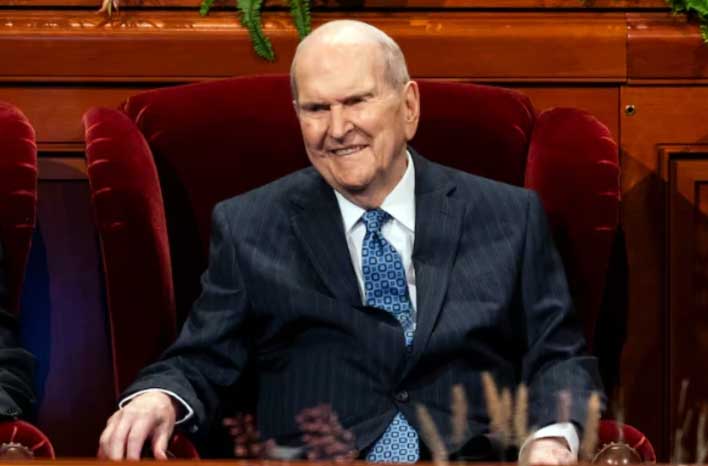RIP Russell M. Nelson: A Life of Faith and Service
Russell M. Nelson, the president of The Church of Jesus Christ of Latter-day Saints, has passed away at the age of 101. He died on September 27, 2025, at his home in Salt Lake City. As the church’s president, Nelson was also revered as a prophet, holding significant influence over the church’s direction and its 17 million members worldwide.
Early Life and Education
Nelson was born on September 9, 1924, in Salt Lake City, Utah. He grew up in a devout Latter-day Saint family and developed a strong faith from a young age. Nelson served a mission for the church in the Netherlands from 1944 to 1946. He later attended the University of Utah, where he earned a bachelor’s degree in bacteriology. Nelson went on to study medicine at the University of Minnesota, where he earned his medical degree.
Medical Career
Before becoming a full-time church leader, Nelson had a distinguished career as a heart surgeon. He was a pioneer in the field of cardiothoracic surgery and was known for his expertise in heart transplantation. Nelson served in the U.S. Army Medical Corps during the Korean War and later became a prominent figure in cardiothoracic surgery. He was a fellow of the American College of Surgeons and a member of the American Association for Thoracic Surgery.
Church Leadership
Nelson was ordained as an apostle in 1984 and served in various leadership roles within the church. He became the president of the church in 2018, succeeding Thomas S. Monson. As president, Nelson was known for his strong leadership and his commitment to the church’s mission. He was a prolific writer and speaker, and his messages were widely followed by church members around the world.
Key Accomplishments and Changes Under Nelson’s Leadership
During his tenure as president, Nelson implemented several significant changes within the church. Some of the key accomplishments and changes include:
- Temple Expansion: Nelson announced 200 new temples in less than eight years, more than doubling the total number built or in planning when he became president. This expansion effort was a major focus of Nelson’s presidency, and it reflected his commitment to providing church members with more opportunities to participate in temple ordinances.
- Rebranding the Church: Nelson removed the term “Mormon” from the church’s branding, citing the need for members to clearly identify as Christian and align with other Christian sects. This change was part of a broader effort to emphasize the church’s Christian identity and to reduce confusion among non-members.
- COVID-19 Response: As a former heart surgeon, Nelson encouraged members to wear masks and get vaccinated during the pandemic. He also emphasized the importance of following public health guidelines and respecting the sacrifices of healthcare workers.
- Sunday Meeting Changes: Nelson shortened Sunday meetings from three to two hours, allowing members to better balance their church and family responsibilities.
- Missionary Policy Changes: Nelson allowed missionaries to call their families weekly, relaxing rules that previously restricted conversations to Christmas and Mother’s Day. This change reflected the church’s growing recognition of the importance of family support for missionaries.
- Temple Rites and Ceremonies: Nelson made changes to temple rites and ceremonies to allow women more participation and reduce emphasis on their subordination to men. These changes reflected the church’s ongoing efforts to promote greater equality and respect for women within the church.
Personal Life and Background
Nelson was married to Dantzel White until her death in 2005. He later married Wendy Watson in 2006. He is survived by his second wife, Wendy, and eight of his 10 children. Nelson was known for his love of the outdoors and was frequently spotted hiking or skiing in the Wasatch Mountains well into his 90s.
Legacy
Nelson’s legacy includes his efforts to increase the church’s global presence and his commitment to family and community values. Despite controversy surrounding some of his decisions, Nelson is remembered as a kind and humble leader who made significant contributions to the church. His leadership style was characterized by a strong emphasis on faith, hope, and charity, and he encouraged church members to cultivate these qualities in their own lives.
Succession
Dallin H. Oaks, Nelson’s First Counselor, is expected to become the next president of the church. Oaks has been a close associate of Nelson’s for many years and has played a key role in implementing many of the church’s recent changes. As the new president, Oaks will face the challenge of building on Nelson’s legacy while also addressing the church’s ongoing needs and challenges.
Conclusion
Russell M. Nelson’s passing marks the end of an era for the Church of Jesus Christ of Latter-day Saints. As a prophet and leader, Nelson played a significant role in shaping the church’s direction and guiding its members. His legacy will be remembered for generations to come, and his contributions to the church will continue to be felt. As the church looks to the future, it will do so with gratitude for Nelson’s life and service, and with confidence in the continued guidance of the Holy Spirit.







